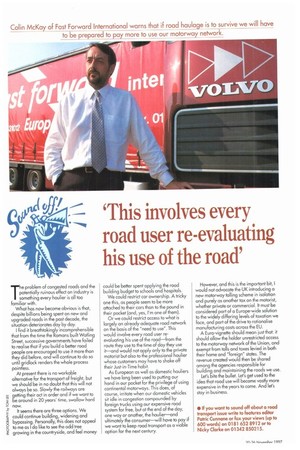Colin McKay of Fast Forward International warns that if road
Page 54

If you've noticed an error in this article please click here to report it so we can fix it.
haulage is to survive we will have to be prepared to pay more to use our motorway network.
'This involves every road user re-evaluating his use of the road'
The problem of congested roads and the potentially ruinous effect on industry is something every haulier is all too familiar with.
What has now become obvious is that, despite billions being spent on new and upgraded roads in the past decade, the situation deteriorates day by day.
I find it breathtakingly incomprehensible that from the time the Romans built Watling Street, successive governments have failed to realise that if you build a better road people are encouraged to use it more than they did before, and will continue to do so until gridlock renders the whole process pointless.
At present there is no workable alternative for the transport of freight, but we should be in no doubt that this will not always be so Slowly the railways are getting their act in order and if we want to be around in 20 years' time, swallow hard now.
It seems there are three options. We could continue building, widening and bypassing Personally, this does not appeal to me as I do like to see the odd tree growing in the countryside, and feel money could be better spent applying the road building budget to schools and hospitals. We could restrict car ownership. A tricky one this, as people seem to be more attached to their cars than to the pound in their pocket (and, yes, I'm one of them). Or we could restrict access to what is largely an already adequate road network on the basis of the "need to use". This would involve every road user reevaluating his use of the road—from the route they use to the time of day they use it—and would not apply only to the private motorist but also to the professional haulier whose customers may have to shake off their Just-in-Time habit.
As European as well as domestic hauliers we have long been used to putting our hand in our pocket for the privilege of using continental motorways. This does, of course, irritate when our domestic vehicles sit idle in congestion compounded by foreign trucks using our expensive road system for free, but at the end of the day, one way or another, the haulier—and ultimately the consumer—will have to pay if we want to keep road transport os a viable option for the next century. • If you want to sound off about a road transport issue write to features editor Patric Cunnane or fax your views (up to 600 words) on 0181 652 8912 or to Nicky Clarke on 01342 850215. However, and this is the important bit, I would not advocate the UK introducing a new motorway tolling scheme in isolation and purely as another tax on the motorist, whether private or commercial. It must be considered part of a Europe-wide solution to the widely differing levels of taxation we face, and part of the drive to rationalise manufacturing costs across the EU. A Euro-vignette should mean just that: it should allow the holder unrestricted access to the motorway network of the Union, and exempt from tolls and taxes levied in both their home and "foreign" states. The revenue created would then be shared among the agencies responsible for building and maintaining the roads we use. Let's bite the bullet. Let's get used to the idea that road use will become vastly more expensive in the years to come, And let's stay in business.
















































































































